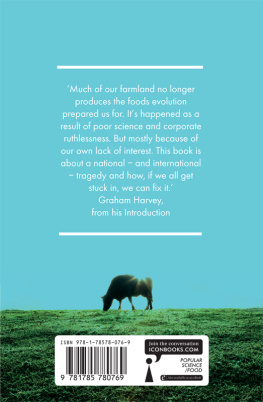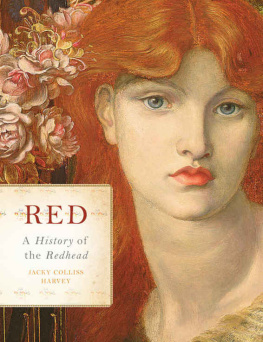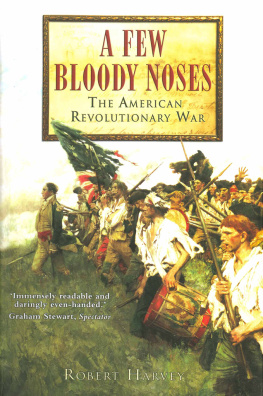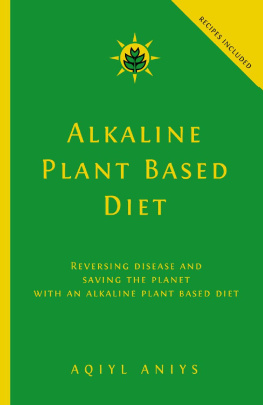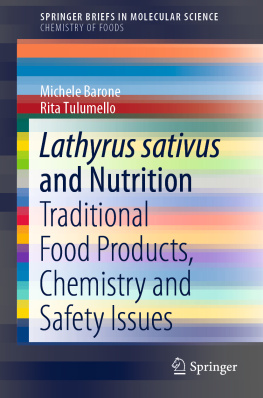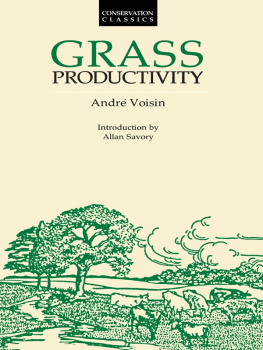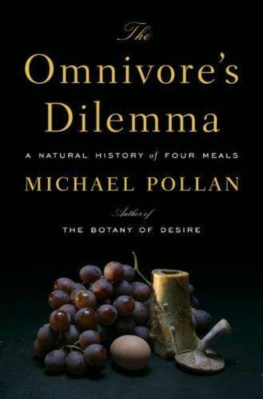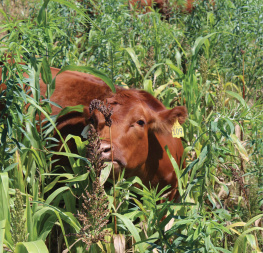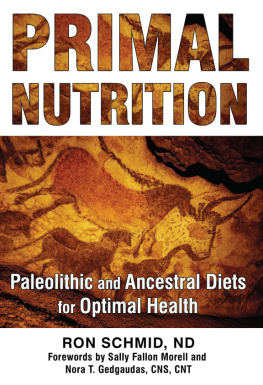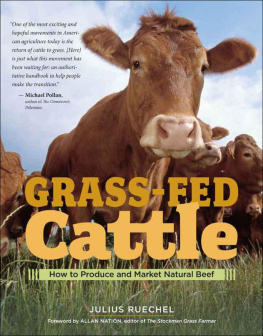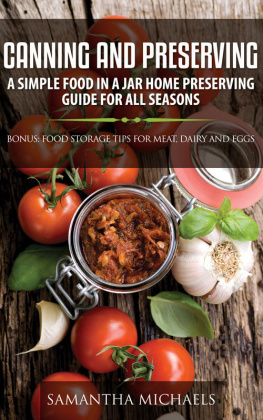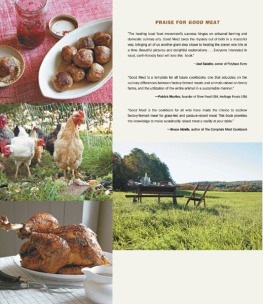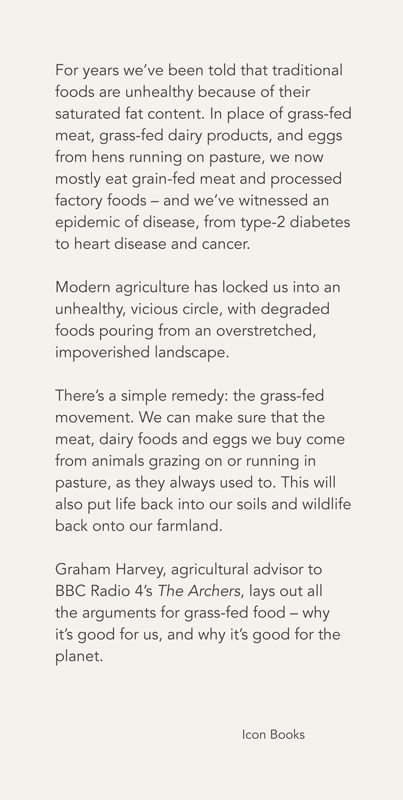GRASS-FED NATION
Praise for Graham Harveys previous books
The Killing of the Countryside
He explodes the myth of cheap food with a few simple statistics
John Humphrys, New Statesman
I fully support this books profound and Blake-like charge
John Fowles, Sunday Times
A modern Grapes of Wrath
Simon Jenkins, The Times
A brave, much-needed book
John Vidal, The Guardian
A forceful, informed and authoritative account of the state of farming and the countryside
Bryn Green, Spectator
We Want Real Food
Passionate, well-argued and thought-provoking
Independent on Sunday
Explains clearly that we can all make a change in what we eat and radically improve our health
The Ecologist
A book that deserves to be properly chewed over
Felicity Lawrence, The Guardian
GRAHAM HARVEY
GRASS-FED NATION
GETTING BACK THE FOOD WE DESERVE

Published in the UK in 2016
by Icon Books Ltd, Omnibus Business Centre,
3941 North Road, London N7 9DP
email:
www.iconbooks.com
Sold in the UK, Europe and Asia
by Faber & Faber Ltd, Bloomsbury House,
7477 Great Russell Street,
London WC1B 3DA or their agents
Distributed in the UK, Europe and Asia
by Grantham Book Services,
Trent Road, Grantham NG31 7XQ
Distributed in the USA
by Publishers Group West,
1700 Fourth Street, Berkeley, CA 94710
Distributed in Canada
by Publishers Group Canada,
76 Stafford Street, Unit 300, Toronto, Ontario M6J 2S1
Distributed in Australia and New Zealand
by Allen & Unwin Pty Ltd,
PO Box 8500, 83 Alexander Street,
Crows Nest, NSW 2065
Distributed in South Africa
by Jonathan Ball, Office B4, The District,
41 Sir Lowry Road, Woodstock 7925
Distributed in India by Penguin Books India,
7th Floor, Infinity Tower C, DLF Cyber City,
Gurgaon 122002, Haryana
ISBN: 978-1-78578-076-9
Text copyright 2016 Graham Harvey
The author has asserted his moral rights.
No part of this book may be reproduced in any form, or by any means, without prior permission in writing from the publisher.
Typeset in Minion by Marie Doherty
Printed and bound in the UK by Clays Ltd, St Ives plc
ABOUT THE AUTHOR
Graham Harvey has written on food and farming for Farmers Weekly, the Sunday Times, the Daily Mail, New Scientist and Country Life. For three years he wrote the Old Muckspreader column in Private Eye. In the mid-1980s he joined the script-writing team of The Archers, since when he has written more than 600 episodes of the BBC drama; he is currently the programmes agricultural advisor. Grahams first book, The Killing of the Countryside, was winner of the BP Natural World Book Prize. He is also co-founder of the countrys leading conference on low-input, ecological agriculture the Oxford Real Farming Conference.
To the memory of Walter Yellowlees
A Doctor in the Wilderness
Introduction (Paradise Wasted)
I f you needed a way to assess the general state of modern Britain you probably wouldnt choose to count its hedgehogs. You might take look at the FTSE share index, I suppose. Or perhaps the current level of spending on the health service. But the number of hedgehogs? Unlikely, Id say.
Not so long ago these oddly endearing animals were the butt of many a stand-up comics jokes. In the face of danger theyre in the habit of rolling their spiny bodies into a tight ball, a defence mechanism thats spectacularly unsuccessful against trucks. Which meant you often used to see them dead on the roads.
These days you rarely see a squashed hedgehog. This doesnt mean were driving any better. It simply means there arent nearly so many around as there used to be. Some surveys show their numbers may have halved in a decade. But its not the traffic thats killing them. Its the countryside.
The hedgehog is just one of a long list of wild species that have fallen victim to whats happening in rural Britain. Not long ago our countryside provided a home for huge numbers of wild animals, birds and plants. Today it has become a hostile place for many of them. This ought to come as a wake-up call because its rapidly becoming a hostile place for us as well.
Even though most of us live in towns and cities we retain a deep affection for, not to mention pride in, our countryside. We tune in to wildlife and countryside programmes in our droves. In the annual orgy of national flag-waving that is the Last Night of the Proms, we sing passionately about bringing Jerusalem to our green and pleasant land. But while it may still be green, much of it isnt that pleasant any more.
Its been taken over by what could almost be described as an alien culture. It furthers the interests of a few, while rapidly ruining things for the rest of us. Our elected politicians seem unwilling to step in. In fact most of them welcome the changes as progress. The media, meanwhile, rarely subject this rural occupation to any degree of rigorous examination.
This book is about the Britain we all seem to have turned our backs on the 70 or so per cent of our land that our food comes from. Its the part of our environment that we engage with most deeply through the purchasing decisions we make at the checkout, and that also has the biggest effect on our own health. If wild species are being destroyed its we who are doing it. And in our failure to consider the consequences of those decisions, were almost certainly harming ourselves too. The two problems are deeply interlinked.
Managed in all our interests, the countryside could help solve many of the nations greatest challenges, from public health to climate change. Instead its making all our problems a great deal worse.
For people of my generation growing up in the years following World War Two, good food was generally affordable by everyone. Imports were higher then, but food produced at home was from a countryside rich in wildlife. No one saw biodiversity as the enemy of productivity. They were simply the two sides of a sustainable food system.
Today that system has been largely demolished. In its place we have poorer food laden with toxic residues. Our wildlife is vanishing. And where once we had a secure food supply, our ability to feed ourselves in the future looks ever more uncertain.
What it adds up to is the theft of our food heritage. Much of our farmland no longer produces the foods evolution prepared us for. The consequences for the nation are potentially more serious even than the damage caused by the banking crisis. Its happened as a result of poor science and corporate ruthlessness. But mostly because of our own lack of interest.
In the old days of coal-mining, the miners caged canary provided an early warning that the build-up of toxic gases had reached dangerous levels. In the fields of modern Britain its bird populations that have taken some of the biggest hits from modern farming methods.
Among the endangered species is the turtle dove, whose gentle purr was once evocative of summer. In Chaucers time it was known as the bird of love. Its most important food plant is a delicate, smoky-leaved wildflower known as fumitory, a plant that used to be common in arable fields. In todays fields the plant has all but disappeared. It seems the turtle dove may soon follow.

